Related Research Articles

Thomas Jefferson was an American statesman, diplomat, lawyer, architect, philosopher, and Founding Father who served as the third president of the United States from 1801 to 1809. He was the primary author of the Declaration of Independence. Following the American Revolutionary War and prior to becoming president in 1801, Jefferson was the nation's first U.S. secretary of state under George Washington and then the nation's second vice president under John Adams.

George Wythe was an American academic, scholar and judge who was one of the Founding Fathers of the United States. The first of the seven signatories of the United States Declaration of Independence from Virginia, Wythe served as one of Virginia's representatives to the Continental Congress and the Philadelphia Convention and served on a committee that established the convention's rules and procedures. He left the convention before signing the United States Constitution to tend to his dying wife. He was elected to the Virginia Ratifying Convention and helped ensure that his home state ratified the Constitution. Wythe taught and was a mentor to Thomas Jefferson, John Marshall, Henry Clay and other men who became American leaders.
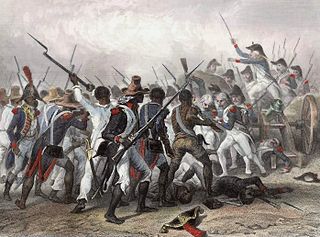
Gabriel's Rebellion was a planned slave rebellion in the Richmond, Virginia, area in the summer of 1800. Information regarding the revolt was leaked before its execution, and Gabriel, an enslaved blacksmith who planned the event, and twenty-five of his followers were hanged.
Randolph Jefferson was the younger brother of Thomas Jefferson, the only male sibling to survive infancy. He was a planter and owner of the Snowden plantation that he inherited from his father. He served the local militia for about ten years, making captain of the local militia in 1794. He also served during the Revolutionary War.
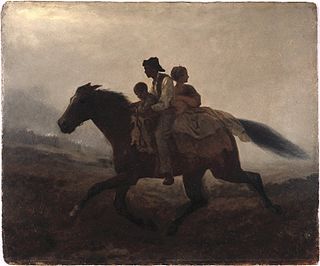
In the United States, fugitive slaves or runaway slaves were terms used in the 18th and 19th centuries to describe people who fled slavery. The term also refers to the federal Fugitive Slave Acts of 1793 and 1850. Such people are also called freedom seekers to avoid implying that the enslaved person had committed a crime and that the slaveholder was the injured party.
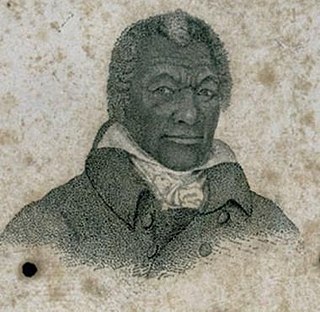
James Armistead Lafayette was an enslaved African American who served the Continental Army during the American Revolutionary War under the Marquis de Lafayette, and later received a legislative emancipation. As a double agent, he reported the activities of Benedict Arnold after he had defected to the British, and of Lord Charles Cornwallis during the run-up to the siege of Yorktown. He fed the British false information while disclosing very accurate and detailed accounts to the Americans.
Peter Field Jefferson was a planter, cartographer and politician in colonial Virginia best known for being the father of the third president of the United States, Thomas Jefferson. The "Fry-Jefferson Map", created by Peter in collaboration with Joshua Fry in 1757, accurately charted the Allegheny Mountains for the first time and showed the route of "The Great Road from the Yadkin River through Virginia to Philadelphia distant 455 Miles"—what would later come to be known as the Great Wagon Road.
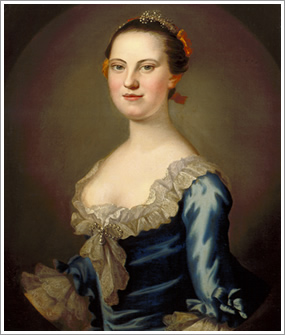
Mary Willing Byrd was an American planter. At twenty years of age, she became the step-mother of five children and managed the family and household at Westover Plantation in Charles City County, Virginia beginning her second year of marriage. Together Byrd and her husband, William Byrd III, had ten more children before he committed suicide in 1777. She determined what property to hold on to and what to sell of what she inherited so that she could pay off debts, preserve Westover Plantation, and retain some land for the Byrd children.
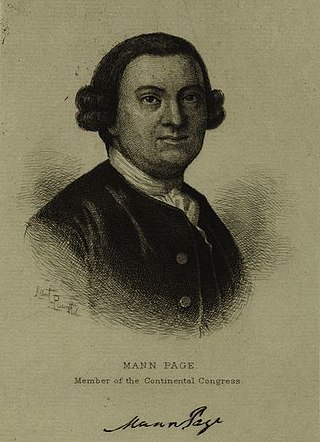
Mann Page (1749–1781), sometimes referred to as Mann Page III, was an American lawyer, politician and planter from Spotsylvania County, Virginia, who served in the House of Burgesses and first Virginia House of Delegates as well as a delegate for Virginia to the Continental Congress in 1777. His elder half brother was Virginia Governor John Page. Since the name was common in the family, and five men of the same name served in the Virginia General Assembly, relationships are discussed below.
The Fugitive Slave Clause in the United States Constitution, also known as either the Slave Clause or the Fugitives From Labor Clause, is Article IV, Section 2, Clause 3, which requires a "Person held to Service or Labour" who flees to another state to be returned to his or her master in the state from which that person escaped. The enactment of the Thirteenth Amendment to the United States Constitution, which abolished slavery except as a punishment for criminal acts, has made the clause mostly irrelevant.

In the American Revolution, gaining freedom was the strongest motive for Black enslaved people who joined the Patriot or British armies. It is estimated that 20,000 African Americans joined the British cause, which promised freedom to enslaved people, as Black Loyalists. Around 9,000 African Americans became Black Patriots.

Faunsdale Plantation is a historic slave plantation near the town of Faunsdale, Alabama, United States. This plantation is in the Black Belt, a section of the state developed for cotton plantations. Until the U.S. Civil War, planters held as many as 186 enslaved African Americans as laborers to raise cotton as a commodity crop.
Thomas Jefferson, the third president of the United States, owned more than 600 slaves during his adult life. Jefferson freed two slaves while he lived, and five others were freed after his death, including two of his children from his relationship with his slave Sally Hemings. His other two children with Hemings were allowed to escape without pursuit. After his death, the rest of the slaves were sold to pay off his estate's debts.

Slavery in Virginia began with the capture and enslavement of Native Americans during the early days of the English Colony of Virginia and through the late eighteenth century. They primarily worked in tobacco fields. Africans were first brought to colonial Virginia in 1619, when 20 Africans from present-day Angola arrived in Virginia aboard the ship The White Lion.
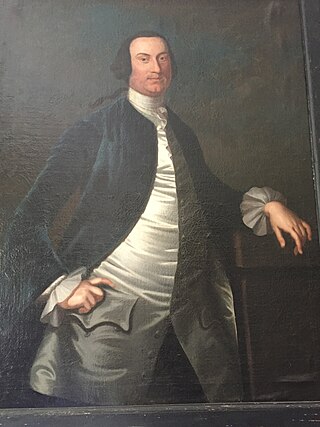
Col. John Tayloe II was the premier Virginia planter; a politician, and colonial Colonel in the Virginia Militia. Virginia. He served in public office including the Virginia Governor's Council, also known as the Virginia Council of State.
In the United States, there are both federal and state laws prohibiting treason. Treason is defined on the federal level in Article III, Section 3 of the United States Constitution as "only in levying War against [the United States], or in adhering to their Enemies, giving them Aid and Comfort." Most state constitutions include similar definitions of treason, specifically limited to levying war against the state, "adhering to the enemies" of the state, or aiding the enemies of the state, and requiring two witnesses or a confession in open court. Fewer than 30 people have ever been charged with treason under these laws.

Winney Grimshaw was an enslaved African-American woman at the Mount Airy Plantation in Richmond County, Virginia. The Grimshaws are one of the most well-documented enslaved families who lived at Mount Airy. Though the Grimshaws were a well-regarded enslaved family at Mount Airy, their enslaver still dissolved her family ties.
References
- 1 2 Jefferson, Thomas (1952). The Papers of Thomas Jefferson: 25 February 1781 to 20 May 1781. Princeton University Press. p. 641. ISBN 9780691045825 . Retrieved 25 August 2015.
- ↑ Pinchbeck, Raymond Bennett (1926). The Virginia Negro Artisan and Tradesman, Volume 103. William Byrd Press. p. 38. Retrieved 25 August 2015.
- 1 2 3 Schwarz, Philip J. "Billy (fl. 1770s–1780s)". Encyclopedia Virginia. Archived from the original on May 18, 2021. Retrieved 25 August 2015.
- ↑ Windley, Lathan A. (1995). A Profile of Runaway Slaves in Virginia and South Carolina from 1730 through 1787. Routledge. p. 125. ISBN 9780815310181 . Retrieved 25 August 2015.
- 1 2 Boles, John B.; Hall, Randal L. (2010). Seeing Jefferson Anew: In His Time and Ours. University of Virginia Press. p. 115. ISBN 978-0813929934 . Retrieved 25 August 2015.
- ↑ McDonnell, Michael A. (2008). The Politics of War: Race, Class, and Conflict in Revolutionary Virginia. UNC Press. p. 438. ISBN 9780807831083 . Retrieved 25 August 2015.
- ↑ Schwarz, Philip J. (1998). Twice Condemned: Slaves and the Criminal Laws of Virginia, 1705–1865. The Lawbook Exchange, Ltd. p. 189. ISBN 9781886363540 . Retrieved 25 August 2015.
- ↑ Appiah, Anthony; Gates, Henry Louis (2005). Africana: The Encyclopedia of the African and African American Experience. Oxford University Press. p. 461. ISBN 9780195170559 . Retrieved 25 August 2015.
- ↑ Journal of the House of Delegates of the State of Virginia. Virginia. General Assembly. House of Delegates. 1781. p. 12. Retrieved 25 August 2015.
- 1 2 Ward, Harry M. (2008). "Going Down Hill": Legacies of the American Revolutionary War. Academica Press. p. 64. ISBN 9781933146577 . Retrieved 25 August 2015.